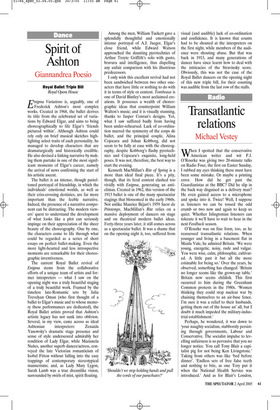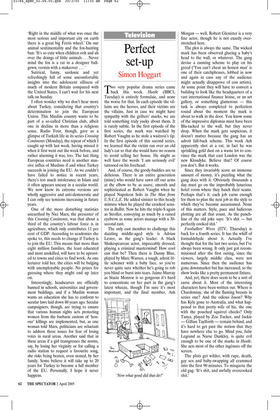Transatlantic relations
Michael Vestey
When I spotted that the conservative American writer and wit P.J. O’Rourke was giving two 20-minute talks on Radio Four, the first on Easter Sunday, I rubbed my eyes thinking there must have been some mistake. Or maybe a printing error. How did he get past the Guardianistas at the BBC? Did he slip in the back way disguised as a delivery man? He even gained access to a microphone and spoke into it. Twice! Well, I suppose as listeners we can be tossed the odd crumb or two now and again to keep us quiet. Whether Islingtonian listeners can tolerate it we’ll have to wait to hear in the next Feedback season.
O’Rourke was on fine form, too, as he reassessed transatlantic relations. When younger and living in a basement flat in Maida Vale, he admired Britain. ‘We were young, energetic, noisy, rude and vulgar. You were wise, calm, philosophic, cultivated. A little past it but all the more estimable for being so.’ Over the years, he observed, something has changed: ‘Britain no longer seems like the grown-up table.’ Britain now seems childish. This first occurred to him during the Greenham Common protests in the 1980s. ‘Women thinking they could stop nuclear war by chaining themselves to an air-base fence. I’m sure it was a relief to their husbands, getting them out of the house an’ all, but I doubt it much impeded the military-industrial establishment.’ Perhaps, he wondered, it was down to ‘your naughty socialism, stubbornly persisting through governments, Labour and Conservative. The socialist impulse to levelling unfairness is so pervasive that you no longer notice. You call Tony Blair a capitalist pig for not being Ken Livingstone.’ Taking from others was like ‘bed before dinner’. ‘Endless sets of free false teeth and nothing to bite, as one Tory put it when the National Health Service was introduced.’ And as for Blair’s London, ‘Right in the middle of what was once the most serious and important city on earth there is a great big Ferris wheel.’ On our animal sentimentality and the fox-hunting ban: ‘It’s so cute when children ooh and ah over the doings of little animals ... Never mind the fox is a rat in a designer ballgown, vermin with a makeover ... ’ Satirical, funny, sardonic and yet refreshingly full of some uncomfortable insights into the adolescent silliness of much of modern Britain compared with the United States. I can’t wait for his next talk on Sunday.
I often wonder why we don’t hear more about Turkey, considering that country’s determination to join the European Union. This Muslim country wants to be part of a so-called Christian club, albeit one in decline in more than a religious sense. Radio Four, though, gave us a glimpse of Turkish life in its series Crossing Continents (Monday), the repeat of which I caught up with last week, having missed it when it first went out the week before, and rather alarming it was, too. The last thing European countries need is another massive influx of Muslims if and when Turkey succeeds in joining the EU. As we couldn’t have failed to notice in recent years, there’s too much intolerance in Islam and it often appears uneasy in a secular world. We now know its extreme versions are wholly aggressive and anti-democratic and I can only see tensions increasing in future years.
One of the more disturbing statistics unearthed by Nici Marx, the presenter of this Crossing Continents, was that about a third of the country’s labour force is in agriculture, which only contributes 11 per cent of GDP. According to academics she spoke to, this needs to change if Turkey is to join the EU. This means that more than eight million families, the least educated and most unskilled, will have to be uprooted to towns and cities to find work. As one lecturer told her, the cities will be bulging with unemployable people. No prizes for guessing where they might end up later on.
Interestingly, headscarves are officially banned in schools, universities and government buildings, and if a Muslim woman wants an education she has to conform to secular laws laid down 80 years ago. Secular campaigners, though, are trying to ensure that various human rights acts protecting women from the barbaric custom of ‘honour’ killings are implemented, but, as one woman told Marx, politicians are reluctant to address these issues for fear of losing votes in rural areas. Another said that in these areas if a girl transgresses the norms, say, by losing her virginity or for calling a radio station to request a favourite song, she risks being beaten, even stoned, by her family. Some believe it will take up to 20 years for Turkey to become a full member of the EU. Personally, I hope it never happens.






























































 Previous page
Previous page